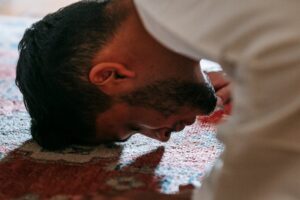Prophethood is an organic and dynamic project. Its phases are highly connected, and it moves through time. One of the common threads that connects the different Prophets and their experiences is the attitude of the masses, or the people, towards the new message and that of the elite, or al-mala’, in every society.
When you study the historical accounts of many prophets displayed in Quran, you always find the elite as a group of people usually in the leadership coming together and driven by their special interests to obstruct and stop the new message that represents a challenge and a threat to them.
“The elite of his community who denied the truth said.” [7:66]
“The elite of his community who are arrogant said.” [7:75]
“The elite of his community who disbelieved, denied the meeting in the hereafter, and overwhelmed by the luxuries of this life said.” [23:33]
The elite share the following characteristics: They cover up the truth, they are self-sufficient and arrogant, they are oblivious to the consequences of their actions, and they have the wealth and the means to stand between the people and the Prophet and his new message. They would even go further to plot for the killing of Moses and to put Jesus on the cross.
Although the elite, or Al-mala’, are human beings like the masses, or the rest of the people, the people and the elite constitute two different paradigms and outlooks. In contrast with the elite, the people or the masses have no special interest or agendas. They are always concerned about the truth, and they are continuously searching for it. Therefore, the emphasis of Quran on the people is very explicit.
“We gave a light whereby he can walk amongst men.” [6:122]
“You are the best of peoples evolved for mankind.” [3:110]
Quran, as described by a Muslim thinker, is the book that starts by the name of Allah and ends with Al-Nass, the people. It is a book from Allah to the people. “Guidance for the people.” [2:185]
The situation of Prophet Mohammad was not different. The elite of Quraysh confronted him, harmed and persecuted his companions, and plotted for his restraint, exodus, and assassination.
Quran, as the reference of direction, guided and reminded the Prophet continuously to take the side of the people, especially the weak among them who were exploited and marginalized by the elite.
“And be patient with those who call upon their Lord morning and evening, seeking His Face; and let not your eyes pass beyond them, seeking the pomp and glitter of this life; nor obey any whose heart We permitted to neglect the remembrance of Us, one who follows his own desires, whose case is disrupted into pieces.” [18:28]
The elite of Quraysh would propose to the Prophet to listen to him with the condition to drive the ordinary people away who happened to be mostly poor and weak.
Quran will again direct the Prophet not to fall into the agenda of the elite.
“Send not away those who call upon their Lord morning and evening seeking His Face.” [6:52]
The awareness of the Prophet about the distinction between the elite who are only interested in defending their special interests, and the people who are only interested in the truth reached its peak when the Prophet had a meeting with representatives of the Meccan elitist leadership. A blind man came and unknowingly interrupted their meeting. Quran documented that incident, and in a very transparent way said about the Prophet:
“He frowned and turned away because the blind man came to him.” [80:1-2]
The issue here is not at all ethical. The Prophet was described a long time before that incident as the most ethical human being.
“And you stand on an exalted standard of character.” [68:4]
The issue here is this: Which direction should the Prophet take: the direction of the elite who are lobbying and negotiating their gains with the Prophet, or the direction of an ordinary man who is seeking guidance and is not driven by any interest. He is physically blind and does know how the Prophet looks. He is also blind to anything provided by the Prophet except for his own spiritual transformation.
“But what could tell you but perchance he might grow in goodness? Or that he might receive admonition, and the teaching might benefit him?” [80:3-4]
The Prophet should not be deceived by the apparently gifted elite who are self-sufficient and arrogant.
“As to one who is self-sufficient, to him you attend; though it is no blame on you if he grows not in goodness.” [80:5-7]
The Prophet, on the other hand had to be an advocate of those who are concerned about the truth and pursuing its path regardless of their position or status in the society.
“But as to him who came to you striving earnestly, with fear in his heart, of him you were unmindful.” [80:8-10]
Quran is very serious about this issue, and the Prophet had to take the matter seriously.
“By no means should it be so! For it is indeed a message to be remembered.” [80:11]
The message for us is the same: Our target must be the people or the masses. We must own their problems and be their advocates. The blind man was a true representative of the people. History showed that he was a gifted and sincere human being and lived to become the governor of Medina at one time when the Prophet was away.
By Dr Walid Khayr




